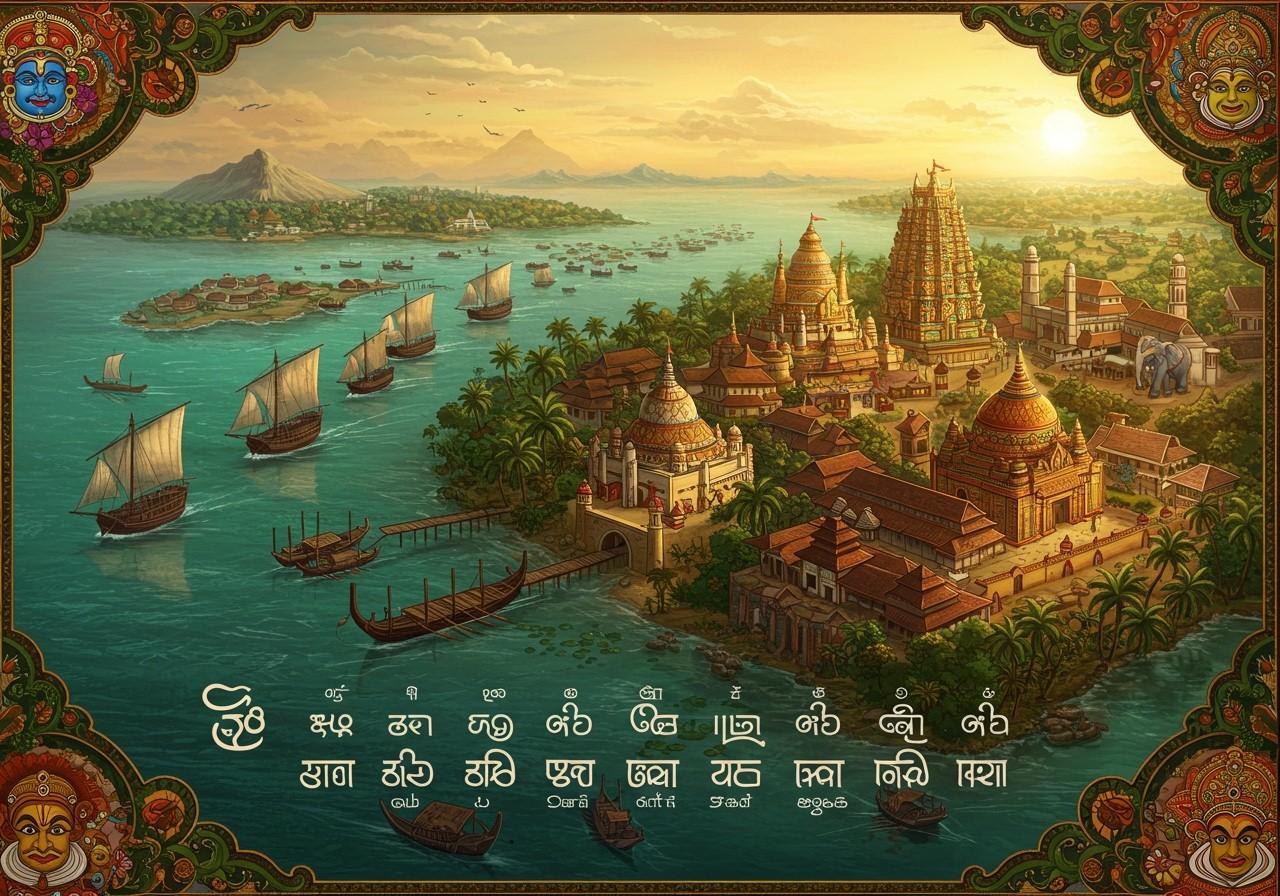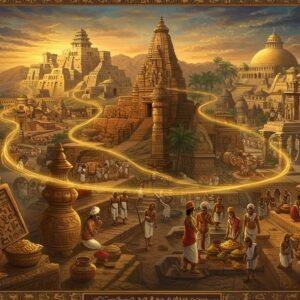
Kerala, a state nestled on the southwestern coast of India, is celebrated for its rich cultural heritage, diverse traditions, and captivating landscapes. This blog delves into Kerala’s intriguing history, encompassing its geological formation, the etymology of its name, and pivotal events that have molded its unique identity. This exploration caters to individuals deeply rooted in Indian culture, especially those aged 25-60, offering a comprehensive understanding of Kerala’s fascinating journey through time.
Geological Formation
Kerala’s geological formation commenced with tectonic movements and volcanic activity, shaping the majestic Western Ghats and the coastal plains. Ancient rivers played a crucial role, depositing alluvial soil that created Kerala’s fertile landscape, ideal for agriculture and spice cultivation. The Malabar Coast significantly influenced the region’s geological development, fostering maritime trade and cultural exchange. Over millennia, climatic shifts impacted Kerala’s topography, leading to the formation of its characteristic backwaters and estuaries. Fossil evidence provides valuable insights into the region’s geological age, revealing a history stretching back millions of years.
The Name ‘Kerala’
The name “Kerala” holds deep historical and cultural significance. Ancient texts and inscriptions, including a 3rd-century BCE rock inscription by Mauryan emperor Ashoka mentioning ‘Keralaputra’, refer to the region by this name. It is believed to derive from “Cheralam,” meaning “the land of the Chera dynasty,” an ancient kingdom that flourished in the region. Dravidian languages have profoundly influenced regional nomenclature. Classical Tamil literature and Sangam poetry, dating back to the first five centuries CE, mention ‘Kerala’, highlighting its ancient roots. Various theories exist regarding the name’s origin, including mythological references, adding to the mystique and allure of this coastal state.
Historical Timeline
Kerala’s historical timeline is punctuated by numerous significant milestones. Prehistoric settlements bear witness to early human habitation, dating back to 4000 B.C. The ancient Chera dynasty played a pivotal role in shaping early Kerala, establishing a strong foundation for its cultural and political development. Maritime trade with Greeks, Romans, Arabs, and Chinese, particularly the spice trade with pepper as a key commodity, enriched the region, fostering cultural exchange and economic prosperity. Major religions, including Hinduism, Buddhism, Jainism, Christianity, and Islam, arrived over time, contributing to the state’s diverse religious landscape. European colonial powers, such as the Portuguese, Dutch, and British, left their mark on Kerala’s socio-economic landscape, influencing its political and administrative systems. Social reform movements in the 19th and 20th centuries played a crucial role in shaping modern Kerala, advocating for social justice and equality. Post-independence, Kerala became an Indian state on November 1, 1956, marking a new chapter in its history.
Cultural Heritage
Kerala’s cultural heritage has evolved over centuries, shaped by diverse influences and traditions. Traditional art forms like Kathakali, Mohiniyattam, and Theyyam are integral to Kerala’s cultural identity, showcasing its artistic richness. Unique architectural styles, such as the Nalukettu and Tharavad, reflect the state’s distinctive building traditions. Culinary traditions and spices, particularly pepper which made Kerala famous among Greeks and Romans, play a vital role in Kerala’s cuisine, tantalizing taste buds with their aromatic flavors. Festivals like Onam, Vishu, and Thrissur Pooram are celebrated with great fervor, preserving cultural heritage and fostering community bonds. Ayurveda and traditional medicine practices are deeply ingrained in Kerala’s culture, offering holistic healing and wellness. Kerala’s poets and writers have made significant contributions to classical and modern literature, enriching the literary landscape. Museums and cultural institutions play a vital role in preserving and showcasing Kerala’s rich heritage for future generations.
Poojn.in: Connecting You to Kerala’s Sacred Traditions
Poojn.in, India’s largest cultural goods and services store, offers a wide array of authentic Kerala ritual items, allowing you to connect with the state’s rich cultural heritage. Whether you’re seeking traditional puja items, sacred ingredients, or unique handicrafts, Poojn.in provides a convenient and reliable platform to access these treasures.
For those seeking Kerala-specific puja needs, Poojn.in offers:
- Nilathodu (നിലത്തോടു): Also known as Neal or Blue Powder, this natural blue dye is traditionally used in Kerala rituals and ceremonies. Available in various quantities from 5 grams to 1 kg, you can find the perfect amount for your specific needs. Explore Nilathodu and other puja essentials on Poojn.in.
- Brass and Bronze Puja Utensils: Crafted in the traditional Kerala style, these utensils add an authentic touch to your puja ceremonies. Discover a wide selection of puja utensils on Poojn.in.
- Traditional Kerala Puja Samagri Kits: These comprehensive kits contain all the essential items required for performing traditional Kerala pujas, ensuring convenience and authenticity. Find the perfect puja kit for your needs on Poojn.in.
Poojn.in simplifies access to these traditional items through:
- Secure Online Ordering: Shop with confidence knowing your transactions are safe and secure.
- Multiple Size Options: Choose the perfect quantity to suit your individual requirements.
- Quality-Checked Authentic Products: Rest assured that you’re receiving genuine and high-quality products.
- Pan-India Delivery: No matter where you are in India, Poojn.in delivers right to your doorstep.
- Detailed Product Descriptions: Available in both English and Malayalam, these descriptions provide valuable information about each product.
Poojn.in is committed to preserving the authenticity of Kerala’s ritual traditions while making these sacred items accessible to devotees across India. The platform acts as a bridge between ancient Kerala customs and the convenience of modern online shopping.
Conclusion
Kerala’s rich history and formation reveal a captivating narrative of cultural and economic evolution. From its geological beginnings to the influence of ancient dynasties, maritime trade, and colonial encounters, Kerala has blossomed into a unique and vibrant state. Its cultural heritage, characterized by traditional art forms, architectural styles, festivals, and culinary traditions, reflects a deep-rooted identity. Understanding Kerala’s past allows us to appreciate its present and look forward to its future with hope and optimism.


